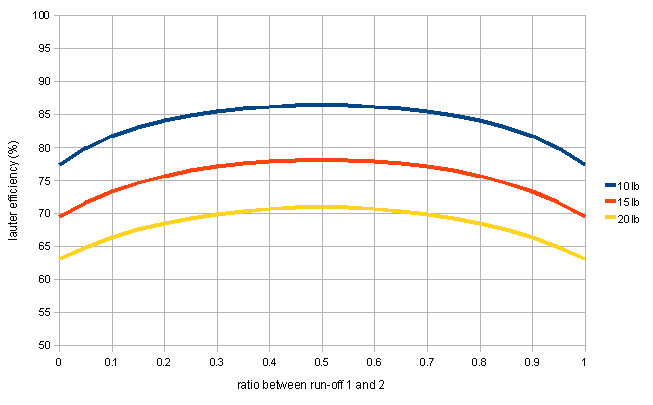I aim for 1.5 quarts/pound but round up or down to the nearest half gallon or so, depending. I really don't sweat the ratio as much as the initial temp.The grist/water ratio is another factor influencing the performance of the mash. A thinner mash of >2 quarts of water per pound of grain dilutes the relative concentration of the enzymes, slowing the conversion, but ultimately leads to a more fermentable mash because the enzymes are not inhibited by a high concentration of sugars. A stiff mash of <1.25 quarts of water per pound is better for protein breakdown, and results in a faster overall starch conversion, but the resultant sugars are less fermentable and will result in a sweeter, maltier beer. A thicker mash is more gentle to the enzymes because of the lower heat capacity of grain compared to water. A thick mash is better for multirest mashes because the enzymes are not denatured as quickly by a rise in temperature.

Thin Mash/Thick Mash...
#21

Posted 30 January 2010 - 07:37 AM
#22

Posted 30 January 2010 - 08:51 AM
This is incorrect. A stiffer mash makes a less fermentable wort.Ken, I just keep my mash stiffness pretty much constant at around 1.25-1.5 qt./lb. Changing mash stiffness is not a good way to control wort fermentability. Much better to always use the same stiffness and control fermentability through mash temperature.I remember reading one time (i think on here) that a thinner mash means a sweeter beer in the end...
#23

Posted 30 January 2010 - 09:25 AM
The effect of mash stiffness on attenuation depends on temperature. For a mash at 150F, the peak fermentability is around 1.3 or 1.4 qts/lb, and a thinner OR a thicker mash will decrease fermentability. For different temperatures of mash, there's a different thickness for optimum attenuation.Chemically, barley tends to have a ton of alpha amylase (AA) and a more restricted amount of beta amylase (BA), so BA is usually the limiting factor in terms of creating simple sugars to increase fermentability. BA is denatured more quickly in hotter mashes (the half-life of BA is shorter at higher temperatures), but BA can also be inhibited by too much sugar, and can be slowed down by sugar concentrations that are too low. At each temperature, there's an optimal concentration of sugar for the BA; more sugar and the BA will be damaged by the high concentrations, less sugar and the BA won't have a chance to react with enough starch molecules before being denatured.This is incorrect. A stiffer mash makes a less fermentable wort.
______0.7 qt/lb_____1.2 qt/lb_____1.7 qt/lb140F____73.3%_______76.1%_______76.2%150F____67.4%_______71.2%_______69.7%155F____64.4%_______65.0%_______65.3%
#24

Posted 30 January 2010 - 10:35 PM
This is incorrect. A stiffer mash makes a less fermentable wort.Ken, I just keep my mash stiffness pretty much constant at around 1.25-1.5 qt./lb. Changing mash stiffness is not a good way to control wort fermentability. Much better to always use the same stiffness and control fermentability through mash temperature.
Looks like the chart backs up mtnbrewer's opinion.When you go left to right in mash stiffness, you get a narrow range of percentage. Example: 150F is 67.4% min to 69.7% max.Go up and down the chart, in temp results in a greater range. Example: At 1.2 qts/lb is 65.0% min to 76.1% max.Unless you do a mash out and stop conversion, your wort is going to continue to change until you reach the equivelant of mash out in your boil kettle. (this is why I like carapils)zymot______0.7 qt/lb_____1.2 qt/lb_____1.7 qt/lb140F____73.3%_______76.1%_______76.2%150F____67.4%_______71.2%_______69.7%155F____64.4%_______65.0%_______65.3%
#25

Posted 31 January 2010 - 08:53 AM
Most of the chart backs up mtnbrewer's opinion, but for a 150F mash and a thickness of 1.7 qt/lb, going stiffer to 1.2 qt/lb will increase fermentability instead of decreasing it.As mtnbrewer said, changing mash stiffness is not a good way to change fermentability. Even though most of the time you get less fermentabiltiy in a thicker mash, there are too many exceptions to use that as a rule.Looks like the chart backs up mtnbrewer's opinion.
#27

Posted 01 February 2010 - 06:52 AM
#30

Posted 01 February 2010 - 06:21 PM
#31

Posted 02 February 2010 - 06:58 AM
#32

Posted 02 February 2010 - 09:22 AM
Interesting. This Altbier that I kegged recently was mashed at 148° and I think it's a better beer because of the lower mash temp. I don't know if this would be suitable for a wide range of styles, but I seem to like it better & the body of this beer doesn't seem to suffer at all. I plan to brew tomorrow (a Mexican Amber Lager) and maybe I'll go with 147-148° on that one too. Cheers.Ken, it changes a bit from system to system, that 150°F temp is a bit high. But if you're going for high fermentable beers mashing at 147°F will give you a drier finish. When I was down in NOLA, the brewer at Gordon Biersch said that was their mash temp. Lighter, mouthfeel and a semi dry finish.Classic German brewing.
#33

Posted 02 February 2010 - 09:24 AM
If your beers are too sweet, cut down on the crystal malt, mash in the high 140s, pitch a metric ton of yeast, add more bittering hops, and control the fermentation temperature.Once you have tried all of those, changing your mash thickness from somewhere in the 1.0 to 1.5 qt/lb might be worthwhile, but there are a lot of other variables that are more important than mash thickness.I'm looking for a clue about making the most fermentable wort I can and then making sure that the yeast does its part during primary.
#34

Posted 02 February 2010 - 09:59 AM
#35

Posted 02 February 2010 - 10:16 AM
Not trying to threadjack, but I have an observation/questionLast week I brewed my house IPA. I am very consistent with the mash time of 60 min and SG of 1.056 and FG of 1.016. I had an accidental 2 hour mash last weekend and got a SG of 1.062. I have another 10 days before I rack and check the FG and am interested if I get more attenuation. If my efficiency increase with mash time does that mean I need to crush finer. I realize longer should give me a more fermentable wort, but once conversion completes isn't my SG basically set?In addition to going to a thinner mash, I've also lowered all my mash times a couple degrees and gone to 90 min. (instead of 60 min.) mashes.
#36

Posted 04 February 2010 - 06:09 AM
What is in solution is converted. Not all the starches and sugars come out in a quick mash. Some are still in the grain in the process of dissolution.... but once conversion completes isn't my SG basically set?
#37

Posted 04 February 2010 - 06:32 AM
Maybe. I crush finer than most (.025 gap) and seem to notice no change in efficiency when I cut the mash short. Probably the shortest I've gone is 30 min plus a short mashout. What that did to my attenuation - don't know...........If my efficiency increase with mash time does that mean I need to crush finer. ...........
#38

Posted 04 February 2010 - 06:45 AM
#39

Posted 04 February 2010 - 09:53 AM
Would you consider 60 minutes a quick mash? I'm going to see if I can schedule a 2 hours mash on my next brewday to see if I get the increased efficiency again. If I do I'll consider closing the gap a little on my barley crusher. I now return you to the thin/thick mash discussion..... thanksWhat is in solution is converted. Not all the starches and sugars come out in a quick mash. Some are still in the grain in the process of dissolution.
#40

Posted 05 February 2010 - 06:56 AM
0 user(s) are reading this topic
0 members, 0 guests, 0 anonymous users

















